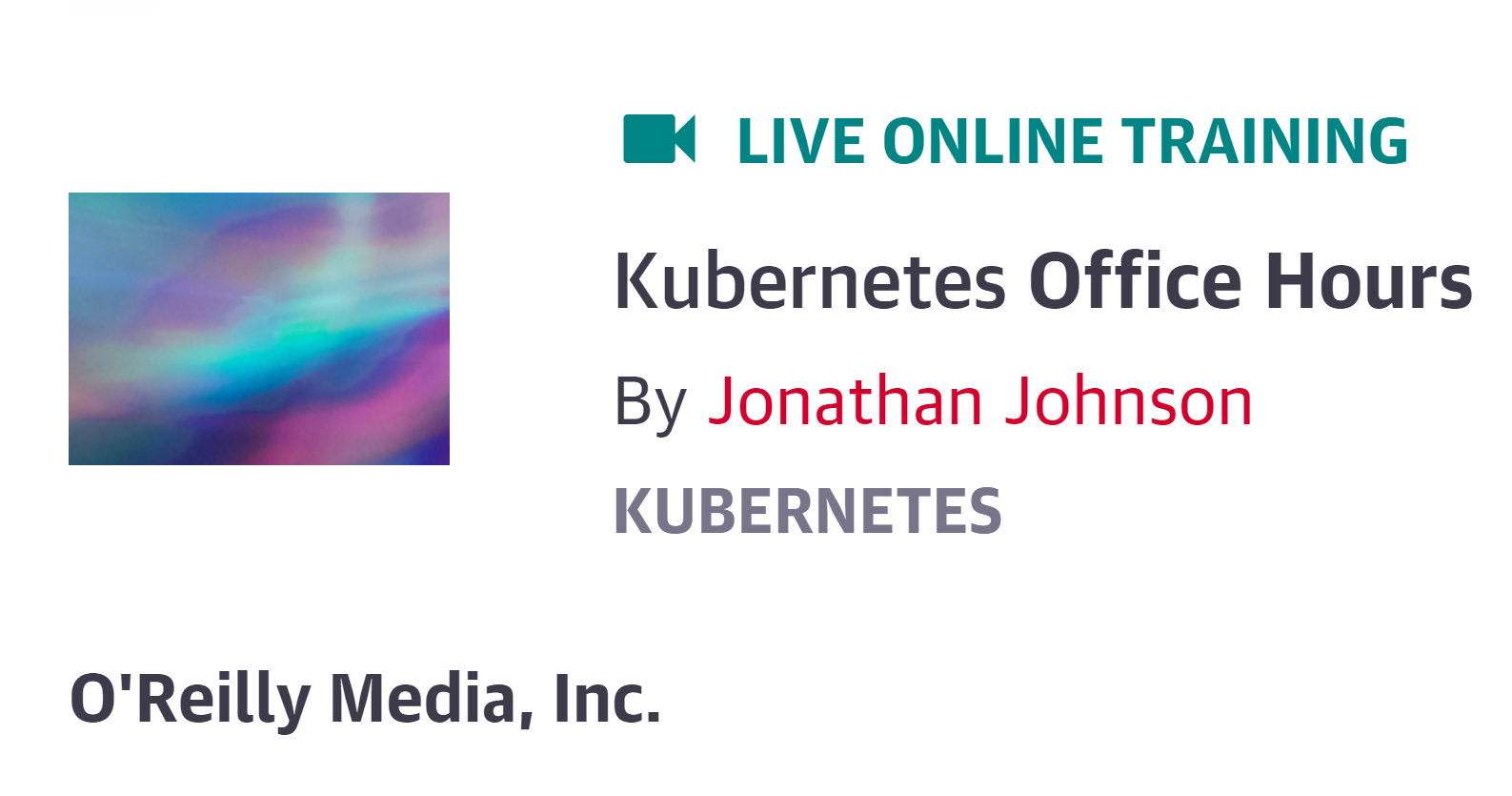
Apr
O’Reilly Live Online Training
Kubernetes Office Hours
Drop in to get your Kubernetes questions answered
How Does Kubernetes Work?
![]()

O’Reilly Live Online Training
01 Sep, 2021
16:00 UTC
O’Reilly Subscription
APAC friendly time.
Distributed application architectures are hard. The complexity in building containers and designing microservices to work together across a network can be overwhelming. Given limitations on resources, failing networks, defective software, and fluctuating traffic, you need an orchestrator to handle these variants.
Kubernetes is designed to handle these complexities so you don’t have to. Essentially a distributed operating system for your data center, you give Kubernetes containers, and it makes sure that they remain available and responsive. As a result, Kubernetes is quickly becoming the preferred way to deploy and serve distributed, scalable, and resilient applications.
In this three-part series, expert Jonathan Johnson walks you through Kubernetes building blocks to demonstrate how the tool actually works. You’ll explore the basics of Kubernetes, learn how to construct containers, discover how to add them to Pods, and more.
You may already understand containers—the tricky part is getting a whole set of containers and services to consistently work together and run reliably. Join in to learn how.
We strongly recommend taking Kubernetes Fundamentals in 3 Weeks before attending this intermediate course.
Increasingly, solutions on Kubernetes follow the Operator pattern, so every Kubernetes developer must get familiar with it. Many architectures, such as Kubeflow, Istio, progressive delivery, queuing and messaging, and data handling, are installed and maintained with Operators.
Kubernetes is a strong platform for running and coordinating large collections of services, containers, and applications, but even with all of its standard resources, Kubernetes can’t do everything. Fortunately, Kubernetes is highly configurable and extensible, and the Operator pattern has emerged from this focus on extensibility. In Week 1, you’ll explore some common open source solutions and a few frameworks commonly used to create operators.
Your applications are built, you’ve deployed them, and they appear to be running fine. But as you’re rolling out new versions of applications, you realize that your feature switches and delivery models are getting stretched. You’re becoming a victim of your own success, and it may be time to consider adding a service mesh.
This week, you’ll learn why architects are adding service meshes to their clusters to help solve the growing complexities of connectivity, security, and observability. You’ll look at two service meshes you may want to consider adding to your cluster, and you’ll get hands-on exploring some working examples with Istio.
Your DevOps team must ensure that your platform is healthy and its delivery system is as frictionless as possible. Fortunately, your continuous integration and delivery pipeline can all be run on Kubernetes. In this session, you’ll learn why Kubernetes is an excellent platform for hosting your continuous tools, pipeline engines, registries, testing, code analysis, security scans, and delivery workflows. You’ll leave understanding the latest tools and techniques for pipelining on Kubernetes. Jonathan will also address the importance of a strong team with a variety of skill sets.
NOTE: With today’s registration, you’ll be signed up for all three sessions. Although you can attend any of the three sessions individually, we recommend participating in all three weeks and pursuing the skills challenges in between sessions.
Hands-on learning with interactive labs
All exercises and labs are provided as O’Reilly interactive labs—complete development environments that are preconfigured with everything you need. There’s nothing to install or configure; just click a link and get started!
Interactive labs are sandboxed, so you can explore, experiment, and tinker without fear of breaking anything. And you can revisit them anytime after class ends to practice and refine your skills.
At the end of each week, Jonathan will provide you with a skills challenge—an interactive scenario-based evaluation to help you determine whether you’ve mastered the skills taught in the live training and whether you’re ready to apply these skills in a real-world setting.
To reinforce your learning, we strongly recommend pursuing each skills challenge before the next week of the course. If you’re unable to successfully complete the challenge, try reviewing the video recording of the live training (emailed to you 24 hours after each session) for tips.
